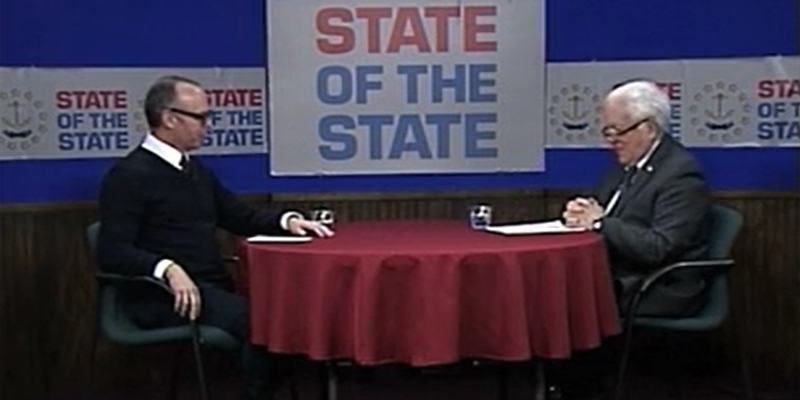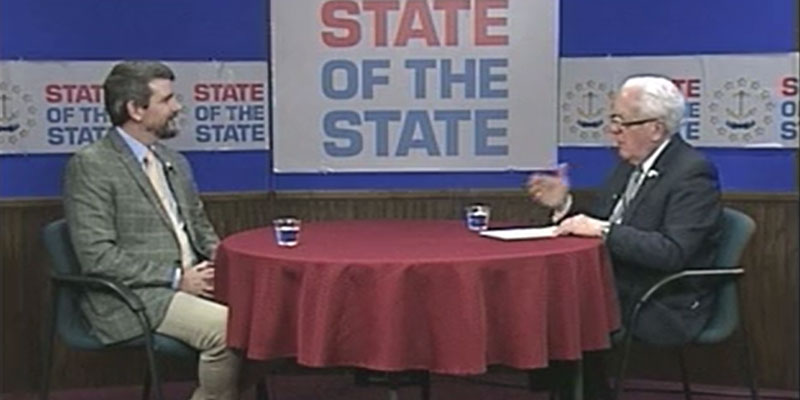Pending Legislation: A Labor Union Perspective (3/28/22) from John Carlevale on Vimeo.
Patrick Crowley, Secretary-Treasurer, RI AFL-CIO, joins host Richard August to discuss pending Rhode Island legislation from a labor union perspective. The discussion includes various voting changes; driver licenses for undocumented persons; $3,000 vaccination incentive/bonuses/retention pay; state employee contracts/wages/benefits packages; minimum wage changes; wage theft by some employers; and some suggestions for changes to existing laws.
[Open full post]Glenn Valentine of the RI Firearm Owners League
John Mark Antonio of the Rhode Island Home Show
Rhode Island Federation of Gardening
Art at the Rhode Island home show
Josh Fenton of GoLocal on the Superman building
Tim Johnson of Propane Plus
Bishop James Hazelwood of the ECLA
Todd Bensman of the Center for Immigration Studies
Ethan Hattoy of Hattoy’s Nurser and GardenCenter
Jason Simoneau, author of The Job for All Debts
Featured image by Adam Niescioruk on Unsplash.
[Open full post]A theme of progressive politics is coming into sharp clarity, exposing how the ideology brings about totalitarian ends while using the language of freedom, democracy, individualism, civil rights, and so on. Many on the right have observed that the progressive dictionary is simply different from standard English — they use words to mean things that those words don’t mean for everybody else — but there’s a mechanism behind their strategy. How does a platform of representation, diversity, and mutual respect boil down to actually mean elite progressives dictate rigid rules for what everybody must uniformly believe?
We can unravel the thread a bit if we tug on this tweet from Rhode Island progressive David Pepin:
The cultural Taliban’s efforts to seize school boards and cut student access to controversial books are just the warmup act. They’re already going after public libraries in some places. Remember, it CAN happen here.
A couple clicks brings one to a Washington Post article about a library board in Llano County, Texas, which community has a whopping population of about 21,000 spread out over an area 80% the size of Rhode Island. Some in this small rural community object to books that a decade ago would have been widely recognized as well beyond the standards of decency for children, with an emphasis on moving the books elsewhere in the library or putting them behind the counter, and one of the country’s major newspapers labels it as “national news.” Establishment library types like Texas Library Association President-elect Mary Woodward start talking about “the danger” of having “books that only address one viewpoint” and the importance of “diversity of thought.”
This is the first part of the scam.
A year ago, when Dr. Seuss began to fall under the woke movement’s scythe, the tone from American Library Association Director of the Office for Intellectual Freedom Deborah Caldwell Stone was quite different:
“The fact is that library collections are dynamic,” she said. “There’s only so much shelf space, and over time collections will shift.”
Some libraries may move an offending book to the adult collection or historical archives, where it can live as a “historical artifact” that reflects the dominant attitudes of the time it was published.
But perhaps the most important consideration a librarian has is the wants and needs of their readers – is a book reflective of the community the library serves? Is it still popular among readers? If a librarian decides a book is “no longer serving the needs of the community,” it may be weeded out, Caldwell Stone said.
See, it’s not “censorship” if the book is simply being “weeded out” because tastes have changed, it “is no longer reflective of the community the library serves,” or it “no longer serv[es] the needs of the community.” Who decides these things? Well, that’s the other part of the scam.
In Llano, community members began to pay attention to what was in their public library, and they didn’t like what they saw. So, they organized, secured positions on the library commission, and changed the policy to be more reflective of and better serving of the community they represent. This sort of availability of institutions to public control is a significant part of the rhetoric progressives use when they want to pour more and more authority into the hands of government, except they don’t really mean it.
When progressives want to get a wedge into some cultural crack, they’ll cite the unique interests of a very limited area, insisting that it should be permitted to exist by its own terms, as expressed through duly elected or appointed local officials, without interference. When a community anywhere in the United States wishes to live differently, well, then they’re the Taliban, with a view that it is impermissible to represent.
The mechanism is pretty simple, really, amounting to hypocrisy. Progressives’ real coup, though, is taking themselves so seriously that moderates and conservatives believe their stated principles are sincere. That’s true only inasmuch as they truly believe what they say… when translated using their internal dictionary.
Featured image by Reed on Unsplash.
[Open full post]You don’t have to pay very much attention to political discourse in the United States to know that “mass shooting” has a very particular definition. When Americans hear the phrase, they think of one or more psychotic gunmen killing people indiscriminately as an expression of alienation.
It feels deliberate, therefore, that the mainstream media appears to have decided to broaden its use of the term to cover other sorts of shootings affecting more than one people, probably including what used to be known as “gang violence.”
Russians with experience of life in the Soviet Union say that the Communist Party’s propaganda organs would report actual news, but readers had to learn to parse the meaning carefully to understand what was actually going on, and it wasn’t always easy or possible to come to a conclusion. This Orwellian shift is very much like that.
Across a wide range of issues, we’re seeing how the ability to twist a phrase just a little can make a huge difference in the political meaning of an event.
[Open full post]In China, the Communist Party has implemented and is continually expanding a social credit system that seeks to use economic opportunities and restrictions to reward behavior the party likes and punish those who do things it doesn’t. The system affects where people can live, how easily they can access credit, the speed of their Internet service, and more.
Active legislation in Rhode Island and Connecticut shows sympathy for this totalitarian impulse is strong among New England Democrats. In Rhode Island, S2552 would mandate COVID-19 vaccination with stiff penalties:
Violating the proposed vaccine mandate would come with a price. Violators would face “a civil penalty of $50 and shall owe twice the amount of personal income taxes.”
Employers would be responsible for enforcement, requiring workers to provide proof or face a $5,000 fine for each unvaccinated worker.
Note that the $50 penalty would be charged monthly. The top 6 bill sponsors, all Democrats, are Senators Sam Bell (Providence), Tiara Mack (Providence), Jonathan Acosta (Central Falls and Pawtucket), Kendra Anderson (Warwick and Cranston), James Seveney (Bristol, Portsmouth, and Tiverton), and Cynthia Mendes (East Providence and Pawtucket).
Meanwhile, Democrat state representative John Larson in Connecticut has introduced legislation to fine people $20 for failing to vote. One struggles to understand why anybody would think it a good idea to force people to cast a vote against their will on candidates and policies with which they are unfamiliar, but there it is.
And we can expect this impulse to continue to grow. Modern Democrats increasingly believe it is government’s job to conduct the lives of the people, reducing us from citizens to children who must be told what to do and punished when we don’t do it.
[Open full post]To begin with, let’s focus on the word that caught Republicans’ eye and drew out the label, “woke”:
Last month, Sen. Steve Daines (R-Montana) sat down on his office couch and recorded a video explaining that he’d be voting against a $1.5-trillion government spending bill that included $13.5 billion in aid for Ukraine.
“There are 4,000 earmarks in this bill, totaling over $8 billion,” Daines said, gesturing at the tall stack of papers in front of him, then began to name examples. First on the list: $1.6 million for “equitable growth of shellfish aquaculture in Rhode Island.”
Reading Antonia Noori Farzan’s Providence Journal article, two possibilities appear to exist. Either advocates for the earmark are dishonestly downplaying the wokeness of the provision now that it’s drawn attention or they tacked on the word “equitable” to dishonestly give the impression that it’s more woke than it is. If the former, the move deserves objections; if the latter, it invites equal and opposite exploitation of the word choice.
Political semantics are a sideshow, however. The meat of the proposal is what should draw objections.
First, the bulk of the money will go to Roger Williams University (RWU), which is a private organization. This is precisely the problem with earmarks. They empower legislators like Democrat Senators Jack Reed and Sheldon Whitehouse to hand out cash to friends, associates, and people whose affection would be politically beneficial. Beyond the easy and unaccountable access to taxpayer dollars, this practice contributes to our political problems as part of the systemic corruption allowing incumbents to buy votes.
Second, part of RWU’s goal is “to research what kinds of barriers exist for people trying to start aquaculture businesses in Rhode Island, and if changes to state laws and policies are needed,” including the hiring of a lawyer and other staff. The primary “barrier” that Farzan notes is “opposition from neighboring property owners” who object to new commercial uses of public waterways, such as oyster farms.
Maybe the aquaculturalists are in the right or maybe the residents are, but this “equitable” earmark appears to be an effort to leverage the unlimited largesse of the federal government to give a politically favored industry additional leverage over individual citizens. The abuse of language, in short, is tied to an abuse of power.
If the federal government wishes to wade into this murky water, it should do so deliberately and with equal access provided to both sides. Government should absolutely not be funding one side of such public policy debates.
Featured image by John Angel on Unsplash.
[Open full post]On WNRI 1380 AM/95.1 FM, John DePetro and Justin Katz discuss:
- De La Cruz steps out
- Matos kicks off
- Superman talks about takeoff
- Foulkes builds a war chest
- Ruggerio goes after progressives
- The AG gives partial hope to McKee
Featured image by Lucas Sankey on Unsplash.
[Open full post]Something about creating an acronym out of technical jargon for life experiences gives it a dangerously dehumanizing feel. I have in mind this pair of tweets from Democrat state representative Marcia Ranglin:
What are Adverse Childhood Experiences?
CDC indicates that ACEs can have Traumatic experiences in childhood and the teenage years may put children at risk for violence, chronic health problems, mental illness, and substance abuse in adulthood.Some adverse childhood experiences are Gun Violence, Structural Poverty, Structural Racism, Neglect, Hunger, Divorce of Parents, suicide of family member or friend, homelessness and COVID-19.
Even those who buy into the general concept might object to the ideological insinuation of including “structural” social issues on a list with acute traumatic experiences like suicide. But whether or not we keep the list intact, the therapeutic impulse that Ranglin echoes has pitfalls that its advocates apparently don’t see.
The definition of “ACE” appears so broad that it simply means “difficulties,” and if we set as a goal to eliminate those — rather than develop strategies to help people deal with them after they’ve happened — we’re on a path to erase our humanity. Arguably, this impulse is behind the most bedeviling problems we’re facing in our times, and we should doubt the wisdom of progressives’ faith that the discord is merely the discomfort of metamorphosis to a utopian future.
Overcoming difficulties is intrinsic to who we are and our sense of meaning. We’ll look for them if life doesn’t bring them to us. To be sure, we’re objectively better off finding our challenges at a higher level than avoidance of starvation and other fundamental threats to our existence, but if we empower ourselves to wipe out “ACEs,” we’ll soon be wiping out great swaths of meaningful human experience, and probably not a few humans, too.
Featured image by Gabriel on Unsplash.
[Open full post]Please check out my new article on the Ocean State Current when you have a minute. It’s about an attempt by WPRO’s afternoon drive time host to discredit one of the few data professionals who brings forward honest, panoramic COVID-19 data by pointing out that he does not have a Rhode Island physician’s license. Oopsie, only problem is that another Rhode Island doctor, and a pretty famous one at that, also does not have a Rhode Island physician’s license.
[Open full post]Libertarian Party of R.I. (3/15/22) from John Carlevale on Vimeo.
This interview focuses on two aspects: the Libertarian Party’s philosophy and values and its chairman and candidate Billy Hunt. Topics include property rights, legalization of certain drugs, second amendment rights, diminishing and limiting government authority, right to life, freedom of speech, affordable housing, environment concerns, energy sources, and much more. One statement made by Hunt characterizes the libertarian view of government: “With enough time and money, there is nothing the government can’t make worse.” Visit lpri.us
[Open full post]










